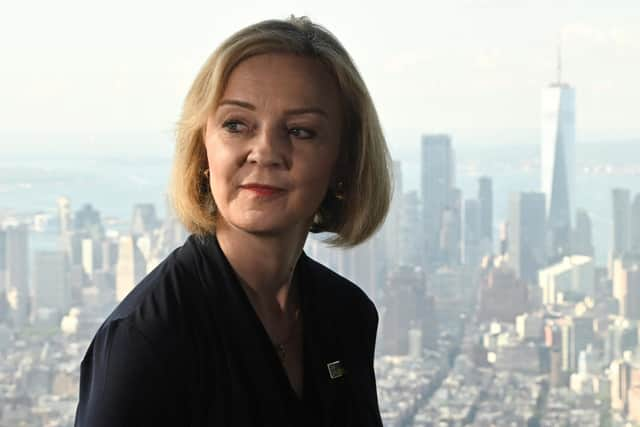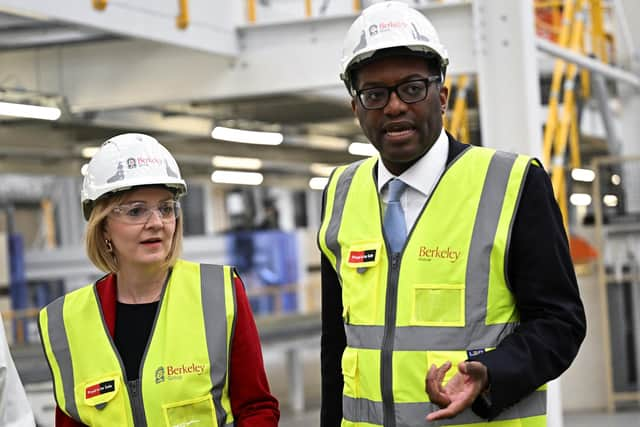Liz Truss £2,500 Energy Claim Explained: PM’s misleading claim on BBC Radio amidst economic crisis
Liz Truss was scrutinised intensely by BBC journalists today as she explained where she has been for the last week while defending economic policies in an interview that critics have called a ‘car crash’.
After Chancellor Kwasi Kwarteng unveiled his ‘mini budget’ plan last week which entailed £45 billion worth of tax cuts, the new Prime Minister seemed to disappear from the public eye.
Advertisement
Hide AdAdvertisement
Hide AdDuring this time the value of the pound plummeted to its lowest ever against the US dollar.


In her first media appearance since, Truss stands accused of mixing up “basic facts” about the cost of living that could “dangerously” mislead others.
Here is what Liz Truss said in her radio interviews in England today and why it has sparked controversy.
What did Liz Truss say about the cost of living?
During the series of eight local interviews, the Prime Minister stated seven times that energy consumers’ bills will be “no more than £2500.”


The statement is thought to be in reference to the energy price cap announced in August, where experts estimated that the average UK household will pay roughly £2,500 annually for their energy.
In one of these interviews, a ‘Diane from Guisborough’ was mentioned who reportedly could not afford to live in her home of 25 years anymore and will have to sell it.
In response, Liz Truss said: "Everybody has been offered help with their fuel bills and that was our priority because people were facing appalling fuel bills and that was the biggest part of the economic package that we put forward on Friday."
Why is Truss’ claim about the price cap false?
Martin Lewis, the financial journalist and broadcaster who founded MoneySavingExpert.com, issued a ‘plea’ on social media on Wednesday to “stop confusion” surrounding the energy price cap.
Advertisement
Hide AdAdvertisement
Hide AdThe price cap exists to limit how much suppliers can charge consumers on default tariffs, and from October 1 the price will rise to £3549 a year - evoking fear in the UK as a cold winter approaches.
Truss, however, misleadingly said that people will pay “no more” than £2,500 but this figure is only the estimate of the average household’s costs and not the cap itself.
This was also said in reference to the “typical” household; a vague comment offering little clarity to those with exceptional circumstances.
Lewis, as a money-saving expert, highlighted that if the difference is not made clear, UK residents could risk being misinformed and charged bills they cannot afford.
He said: “The reason it is so important not to communicate that there is a £2,500 cap is it risks some people, possibly vulnerable elderly people, thinking they can keep the heat on max all winter, and they won’t pay more than a certain amount.”
How have critics responded to Liz Truss’ claims?
The Conservative leader claimed that the Government stepping in had ensured “nobody is paying fuel bills of more than £2,500” and repeated this over several interviews including Radio Kent and Radio Nottingham.
This has sparked controversy amongst critics with some calling the information “dangerously” misleading.
The presenter of BBC Radio 5’s finance programme ‘Wake Up to Money’, Felicity Hannah, said: “Please be really clear – what Liz Truss said about ‘the maximum’ bill being £2,500 doesn’t mean it’s an All You Can Heat buffet offer this winter.
"If you use more than an average home you will pay more.
Advertisement
Hide AdAdvertisement
Hide Ad“I’ve seen a number of people being dangerously confused about that – and I’m afraid that the PM’s comments may have inadvertently confused more.”
What other questions did the BBC ask Liz Truss?
Local BBC radio stations directly grilled the Prime Minister during her media appearance today after her re-emergence amidst intense economic uncertainty in Britain.
BBC Leeds presenter Rima Ahmed, in light of national stress from the economic downturn, sharply asked: “Did you sleep well Prime Minister?”
You can see all the toughest questions the Tory PM was asked, as well as her responses, in our full list here.
Comments
Want to join the conversation? Please or to comment on this article.
